The role of lignans in reducing antibiotic use
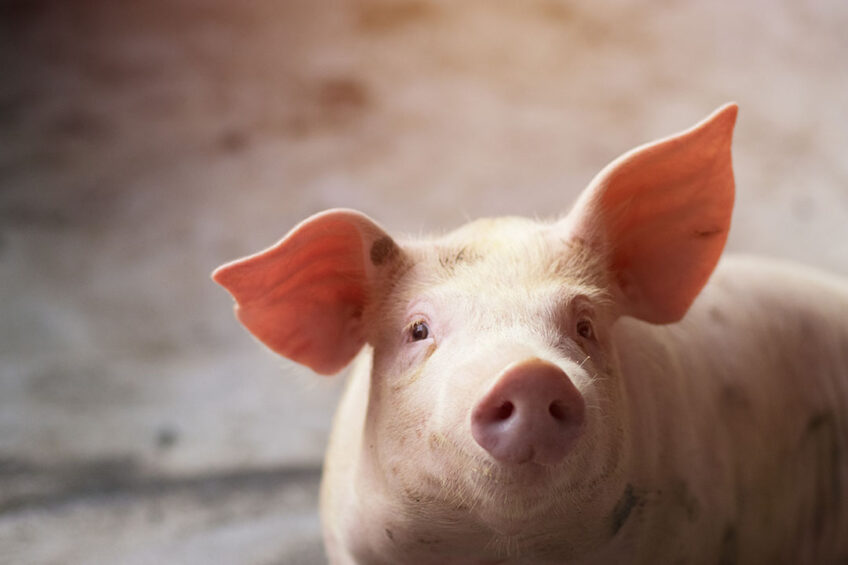
Lignans are bioactive substances derived from wood that can support livestock animals to combat inflammation. As such, they could play a role in reducing the amount of antibiotics that are used on a farm.
Reducing the use of antibiotics in livestock production, as well as for human consumption, has been a priority for a number of years. Last year, the European Food Safety Authority, the European Medicines Agency and the European Centre for Disease Prevention and Control reported a substantial decrease in the use of antibiotics.
The authorities also stated that the use of antibiotics in food-producing animals is now lower than their use in humans; in 2012, the use of antibiotics in livestock production was double that in humans according to the World Health Organization.
Inflammation and its consequences
Despite the global trend of withdrawing antibiotic agents in animal production, in-feed antibiotics are still used in different parts of the world not only to prevent or treat infections but also to improve growth and production. Although not fully understood, the mode of action of antibiotic growth promoters (AGPs) goes beyond simple limitation of microbial activity in the intestinal tract of livestock animals.
Reduction of bacterial growth implies reduced competition for nutrients, but equally important are the anti-inflammatory effects of AGPs in helping to reduce metabolic costs of the immune system. Infections always cause inflammation, a process by which the body tries to protect itself from outside invaders such as bacteria, enterotoxins and endotoxins.
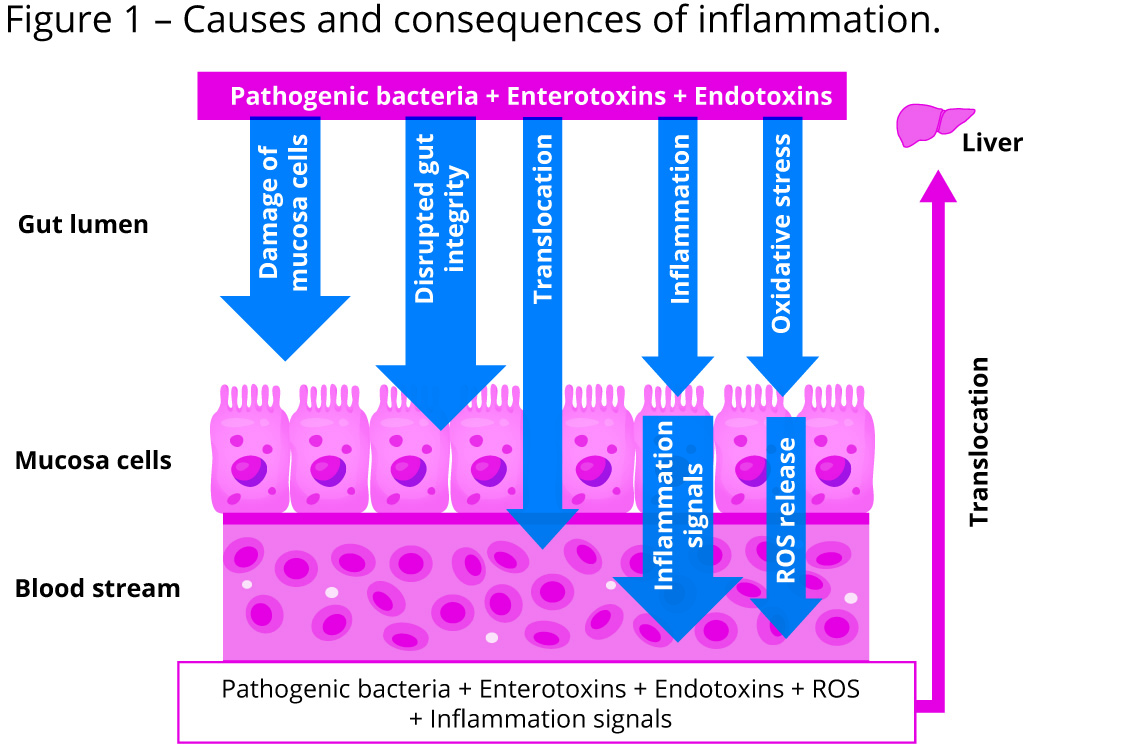
The consequences of inflammatory processes are diverse. Inflammation results in damage to mucosa cells, which disturbs nutrient absorption. As a further consequence, energy and amino acids are needed to repair the damaged cells. These nutrients are lost to the animal. The damage to the mucosa cells subsequently results in disrupted gut integrity, which allows pathogens and toxins to translocate into the bloodstream and enter other parts of the body. The liver, as a central organ, is highly affected by the translocation of toxins and pathogens.
Vicious cycle of inflammation
Mucosa cell inflammation also causes the release of proinflammatory cytokines and other signalling substances. The oxidative stress caused by the presence of pathogenic bacteria, enterotoxins and endotoxins further damages cells and triggers inflammation. This becomes a vicious cycle of inflammation, resulting in the release of reactive oxygen substances.
Liver
The liver is the central organ involved in inflammatory processes such as the production of signalling substances, wound healing etc., which are energy-consuming processes. Detoxification processes also carried out by the liver function are energy-demanding. When the liver itself is affected by inflammation or oxidative stress, the whole system becomes unbalanced. This leads to impaired energy and protein metabolism and consequently to reduced growth and debilitated performance.
How can lignans help?
Wood lignans are molecules that are highly active in the gut, where they reduce the causes and consequences of inflammation by targeting different phases of the inflammatory cascade. Lignans have antibacterial effects. They damage the bacterial membrane, allowing harmful substances to enter the bacterial cell and leading to cell death.
Lignans also provide gut barrier support to prevent pathogenic bacteria, enterotoxins and endotoxins to translocate into the bloodstream and enter other body parts. Lignans are able to directly modulate inflammation, as they can block signalling substances that promote the inflammation cascade.
Furthermore, lignans show highly antioxidative effects due to radical scavenging, resulting in less stress for the gut mucosa and organs. All those characteristics help to control inflammatory reactions caused by infections. Thus, it might be hypothesised that using lignans could help reduce antibiotic use in animal production
Practical little helpers
In a novel approach to using bioactive substances derived from wood, the mode of action of the product Agromed ROI is based on wood lignans. The highly active phytonutrients (= lignans) support animals to combat inflammation, enabling them to perform to their maximum level. Containing highly active wood ingredients, this approach allows lowering of the energy demand for inflammatory processes. This energy saving can be channelled into growth performance.
The formulation of this lignan approach thus contributes to improved feed conversion ratio, supports the animal’s health status and consequently helps to optimise farm profitability.
Animal trials have also shown that the inclusion of this lignan-based strategy in a diet gave performance results similar to and better than when antibiotics were included. However, the different stages of infection/inflammation need to be considered.
Inflammatory processes are usually present during an animal’s lifespan. Mostly these occur at subclinical levels and cannot be seen. When they become visible or reach a clinical stage they need to be treated with pharmaceuticals. Wood lignans are a valuable tool in preventing inflammatory processes getting to a clinical stage.
In a further development, wood lignans were combined with wood-derived phenolic acids, which in combination are highly potent in mitigating causes and consequences of diarrhoea by strengthening the gut barrier – promoting intact gut structure and function. Agromed Protect has strong antioxidative effects that benefit gut mucosa and thus support the animal by preventing diarrhoea, reducing diarrhoea rate and severity and protecting gut integrity. Thus, it helps pigs cope in a challenging period in their life, maintaining high performance and consequently contributes to a farm’s profitability.
Influencing swine physiology
Selecting the proper raw material allows for phytonutrients rich in bioactive molecules which can benefit swine physiology and allow for best performance. With the use of wood lignans, animal nutrition company Agromed Austria was able to create a growth promoter preventing inflammation processes. By combining the lignans with phenolic acids in a further step, a product was developed to act as a problem solver. Those solutions, used preventatively to minimise inflammation, can be helpful tools to avoid the use of antibiotics in animal nutrition.
 Beheer
Beheer
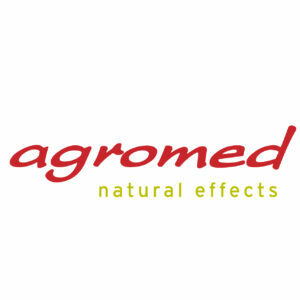

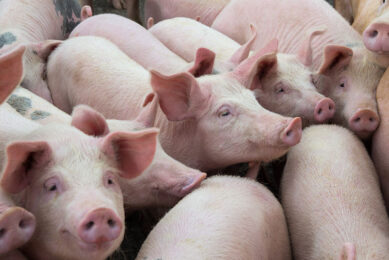
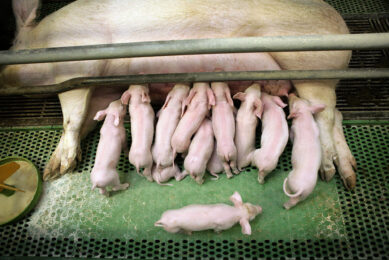
 WP Admin
WP Admin  Bewerk bericht
Bewerk bericht